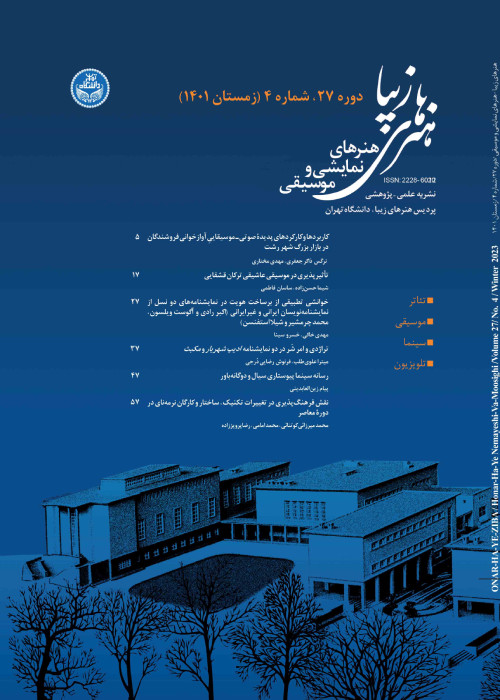Relationship Between the Social Duty and Moral Obligations and Self-Imposed Death*
Author(s):
Abstract:
This paper examines the characteristics of the turbulent 17th and 18th centuries of Japan، investigating their impacts on the Japanese dramatic literature. In particular، we examine the impact of the Tokugawa society on the dramatic literature of Japan، according to the plays Suicide of the Lovers in Sonezaki، and Kanadehon Chushingura. These two examples reveal the entrance of a typical Samurai worldview as prominent characters of the earlier centuries، who were opposing the inclusion of the current society into plays. Thus، with the help of these examples، the article describes the social conflicts of this era، and show that such dramatic works can pave the way for an introduction to understanding the Tokugawa society of the 17th and 18th centuries in Japan. And The establishment of a relationship between the suicide attempts carried out during the Tokugawa dynasty with the dramatic literature of Japan in the 17th and 18th centuries، and the creation of Japan''s most important classic plays such as Kanadehon Chushingura، Suicides of the Lovers at Sonezaki، Suicides of the Lovers at Amijima، and Suicides of the Lovers in Women’s Temple represent a serious push for the social elements. This therefore reveals a serious force that the social factors place on the culture of this period، especially on the writers of this era. These powerful forces which have risen from the social evolutions، provide good information about the formation of new era in Japan. The representative of this evolution was the empowerment of a new social level (businessmen) and the decline of another social level (the worriers). The main objective of this article is to discover the relationship between social duty and ethical commitment with a self wanted death in dramatic literature. One of the most salient impacts of the Tokugawa Shogun family on the dramatic literature is the relationship between the self-wanted death and the ethical duty which is noticeable in the dramatic texts of Japan. This means that one of the most important features of the samurai ideology has left an impressive impact on the dramatic literature. As a matter of fact، it seems that this slogan of the Samurais (Seppuku for Bushido) turned into the theme of the plays of this period، especially the series of plays on the suicide of the lovers. Therefore، if the warrior plays such as Kanadehon Chushingura are considered as the representatives of the plays with the “duty for ethics” theme، then it would be possible to consider the plays on the suicide of the lovers as the representatives of the plays with the theme of the struggle between the social obligations and the human feelings، which wind up in suicide، as they share the same theme. As a result، this article considers how Bushido and Sepuku have entered the society and lead to the emergence of the “shinju for Giri” culture in the society، and afterward in the dramatic literature.
Keywords:
Language:
Persian
Published:
Honar-Ha-Ye-Ziba: Honar-Ha-Ye Mosighi Va Namayeshi, Volume:19 Issue: 50, 2014
Pages:
31 to 40
magiran.com/p1319670
دانلود و مطالعه متن این مقاله با یکی از روشهای زیر امکان پذیر است:
اشتراک شخصی
با عضویت و پرداخت آنلاین حق اشتراک یکساله به مبلغ 1,390,000ريال میتوانید 70 عنوان مطلب دانلود کنید!
اشتراک سازمانی
به کتابخانه دانشگاه یا محل کار خود پیشنهاد کنید تا اشتراک سازمانی این پایگاه را برای دسترسی نامحدود همه کاربران به متن مطالب تهیه نمایند!
توجه!
- حق عضویت دریافتی صرف حمایت از نشریات عضو و نگهداری، تکمیل و توسعه مگیران میشود.
- پرداخت حق اشتراک و دانلود مقالات اجازه بازنشر آن در سایر رسانههای چاپی و دیجیتال را به کاربر نمیدهد.
In order to view content subscription is required
Personal subscription
Subscribe magiran.com for 70 € euros via PayPal and download 70 articles during a year.
Organization subscription
Please contact us to subscribe your university or library for unlimited access!


